General
Empowering and Shaping Tomorrow’s Peacebuilders: Transformative Reflections on a 3-Day Training
Published
1 year agoon
By
Mak Editor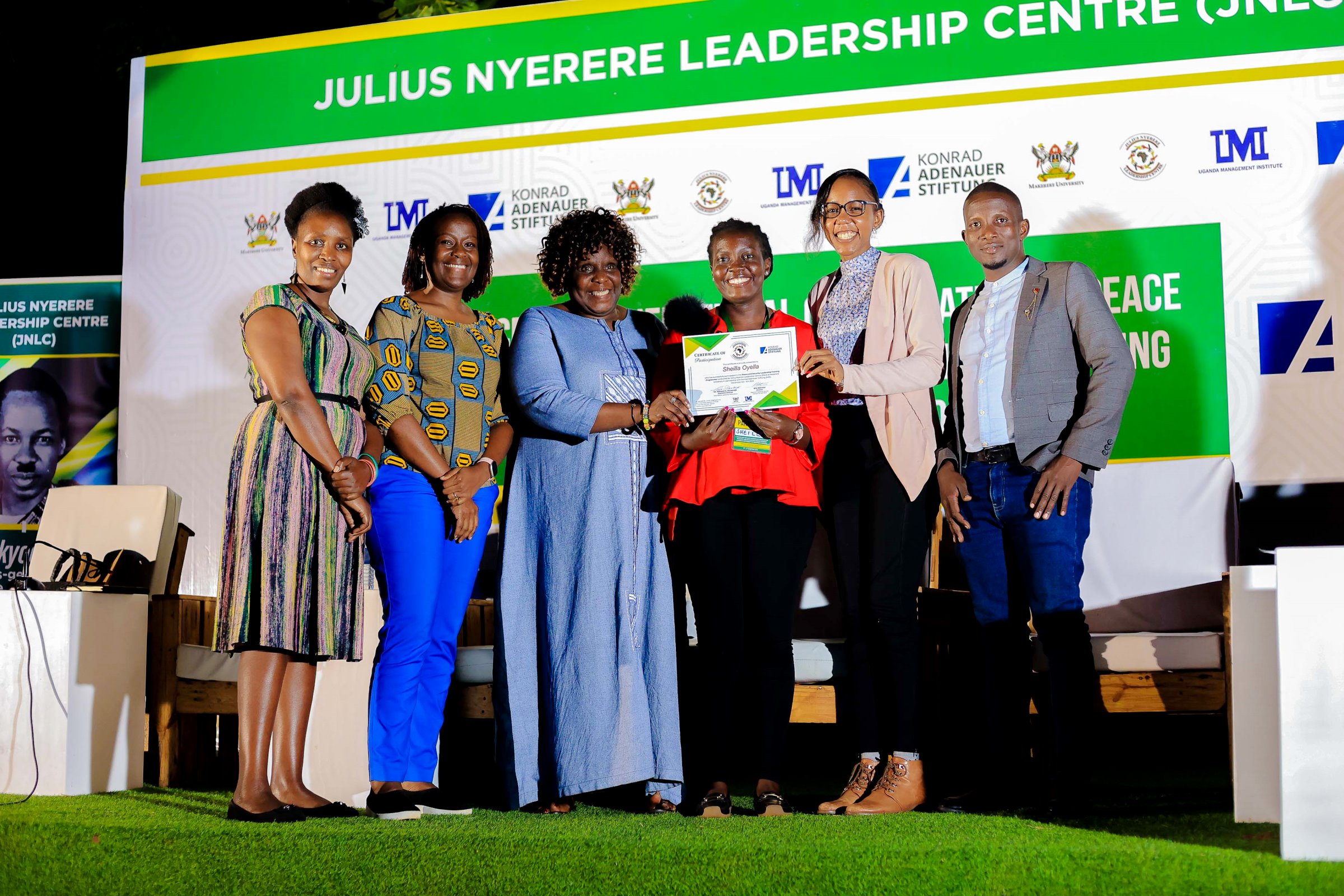
On December 5, 2024, the Julius Nyerere Leadership Centre (JNLC), in partnership with Konrad Adenauer Stiftung (KAS), concluded its three-day Youth Leadership Training Programme with a cross-generational dialogue on peace and security. This dynamic gathering, held in the serene gardens of Julius Nyerere Leadership Centre at Makerere University, brought together student leaders and alumni from various universities to exchange insights with seasoned experts and practitioners.
The “Ekyooto” Experience: Bridging Generations
The event, modeled after the traditional “Ekyooto” fireside gathering, facilitated open conversations between youth and experienced leaders. Discussions tackled peacebuilding, conflict resolution, gender, and regional politics. Participants explored innovative solutions to local and global peace and security challenges, enriched by intergenerational wisdom.
Leadership Perspectives
Dr. Nansozi Muwanga, JNLC Executive Director, emphasised the dialogue’s purpose: bridging young and experienced voices to provide a holistic view of peace and security challenges. She lauded participants’ enthusiasm and highlighted their potential to translate lessons into actionable solutions for their communities.
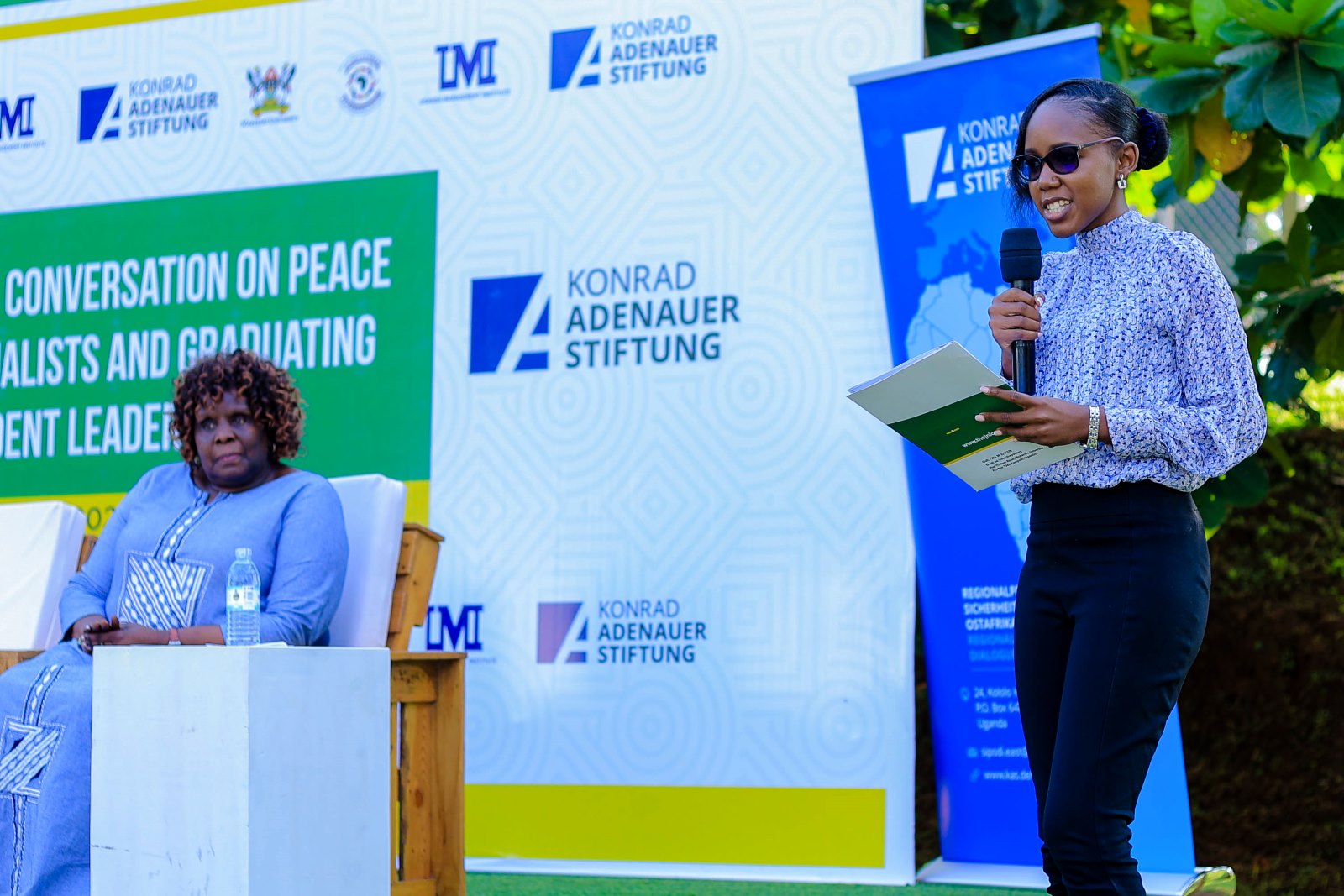
Ms. Angella Kasekende of KAS highlighted the transformative nature of cross-generational conversations, sharing how similar dialogues had shaped her leadership journey. She stressed the value of interactive learning over information-heavy training, enabling participants to directly engage with experts.
Insights from Prof. Julius Kiiza
Prof. Julius Kiiza, a political science and political economy expert, delivered a thought-provoking presentation on Servant Leadership, Pan-Africanism, and Peacebuilding in the Great Lakes Region. Addressing the question Whose Security Counts?, he argued that true peace extends beyond the absence of war to encompass human, economic, and cyber security. He urged leaders to prioritize citizens’ welfare, economic opportunities, and meritocracy, framing these within the broader concept of Staatsbildung (state-building).
Key Themes and Reflections
- Human-Centered Security: Addressing unemployment, access to resources, and functioning institutions as prerequisites for genuine peace.
- Meritocracy and Good Governance: Advocating for competence-based leadership to drive national progress.
- Pan-African Aspirations: Exploring the potential for African unity, inspired by historical state-building models.
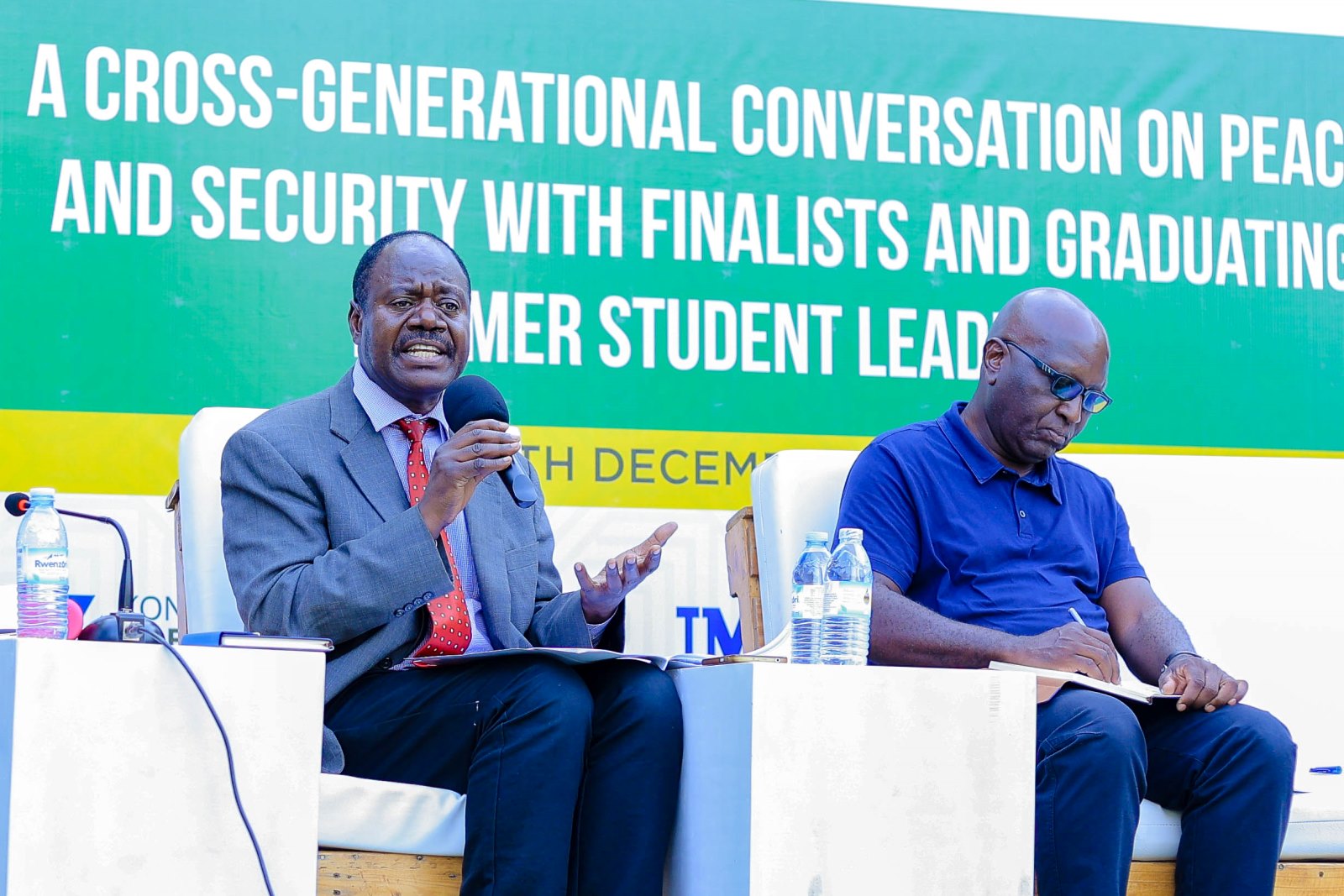
Cross-Generational Panel Explores Root Causes of Conflict
Moderated by Prof. Julius Kiiza, a distinguished panel at the Julius Nyerere Leadership Centre included Prof. Philip Kasaija, Prof. Helen Nambalirwa Nkabala, Ms. Joanna Grace Nakabiito, and Ms. Nashiba Nakabira. They addressed the root causes of conflict and strategies for peacebuilding, drawing insights from academia, policy, and practice to address the root causes of conflict, identity-related disputes, and the roles of youth and women in peacebuilding.
Root Causes of Conflict
The panelists identified marginalisation, greed, colonial legacies, and identity-based disputes tied to religion, ethnicity, or politics as key conflict drivers. To understand identity-based conflicts, participants were asked, “What non-negotiable rights are you ready to fight for?”
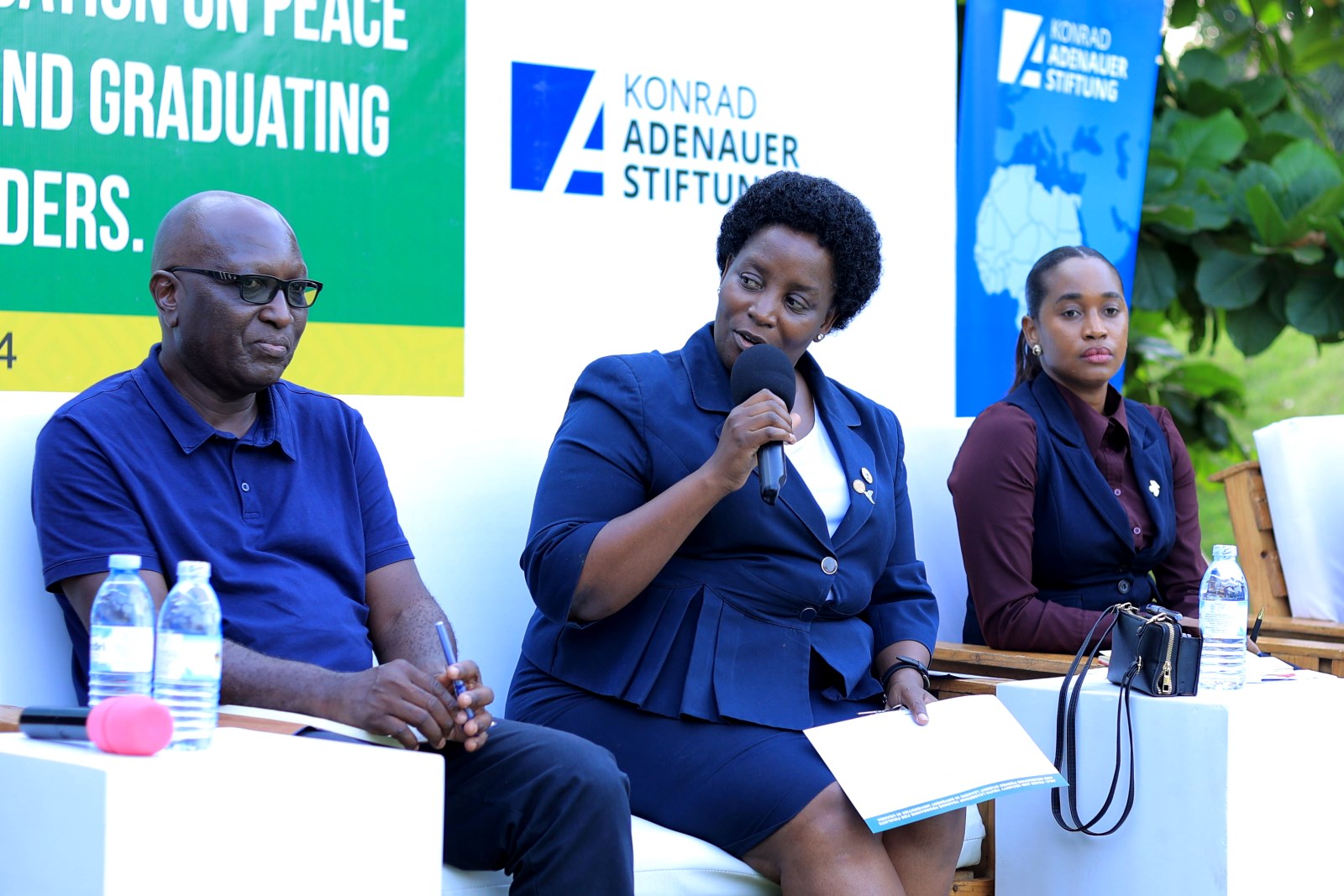
Prof. Nkabala urged a shift from a “hardware” focus on peace (guns and uniforms) to human security, emphasizing livelihoods, governance, and distinguishing positive peace from mere absence of conflict. She also highlighted the media’s dual role in fueling or resolving disputes, stressing the importance of trauma-informed peacebuilding and responsible journalism.
Prof. Kasaija categorised conflicts using the “conflict tree” framework, noting interconnections among colonialism, resource greed, and constructed identities. He highlighted the evolution of security from state-centered to human-focused, emphasizing individual well-being as a pillar of stability.
Ms. Nakabiito addressed the complexity of identity conflicts, which are deeply tied to self-concept and collective identity. She stressed the need to address marginalisation and dismantle media narratives that portray such disputes as irrational.
Tackling Conflict and Building Peace
Panelists agreed on the need for inclusive, multi-dimensional approaches to address the root causes of conflict. They emphasized leadership, collaboration, and proactive engagement by youth and women as essential for fostering sustainable peace. The discussion offered participants practical frameworks and insights to address challenges, inspiring them to drive transformative change in their communities.
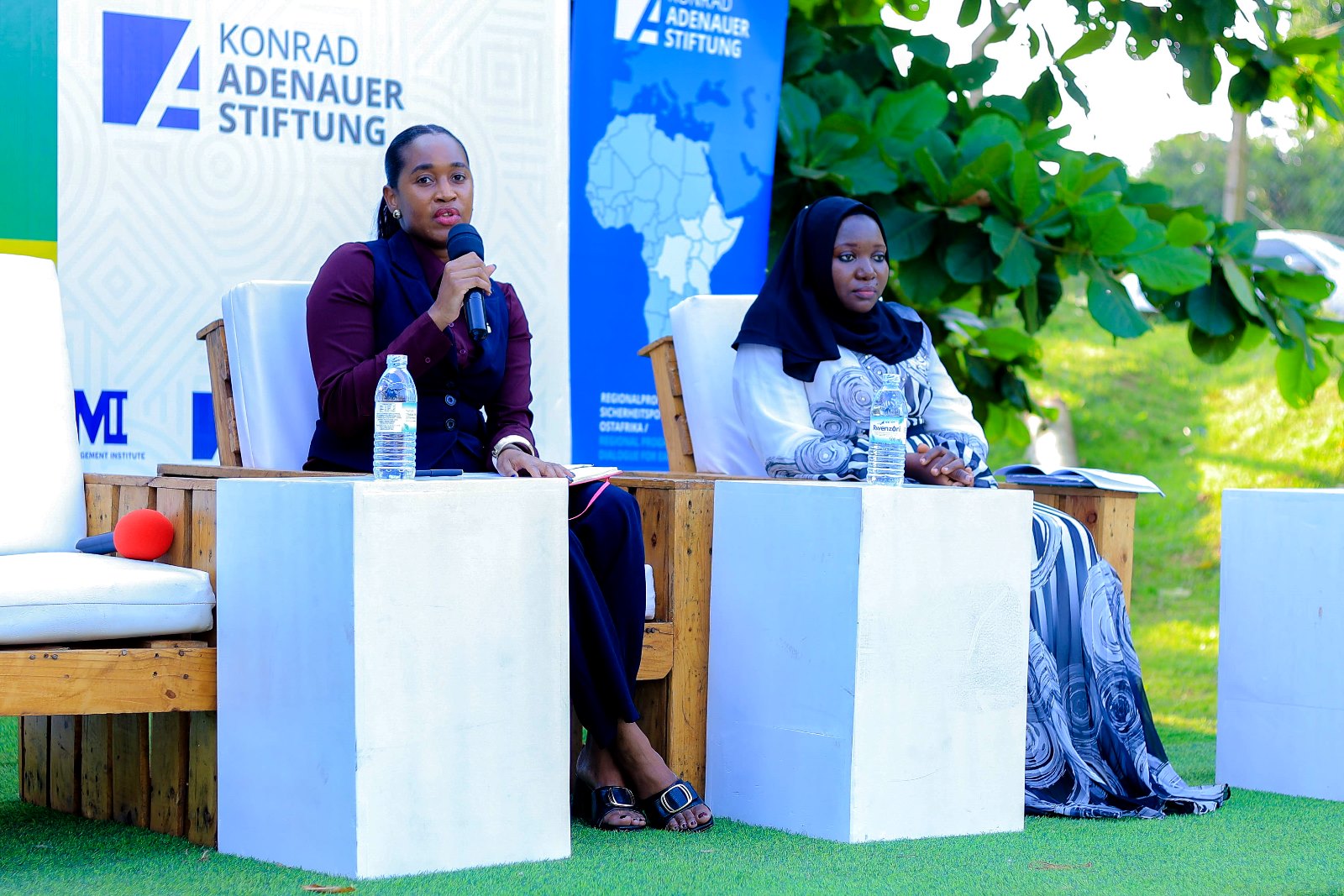
Key Takeaways from Panelists:
Prof. Helen Nambalirwa Nkabala
- Advocated for a human-centric approach to peace and security, highlighting livelihoods, human rights, and the distinction between positive and negative peace.
- Stressed governance and representation as essential pillars for societal harmony.
- Emphasized the responsibility of the media in fostering peace, warning against dehumanizing language and sensationalism that escalate conflicts.
- Advocated for trauma-informed peacebuilding, urging the need to address unresolved trauma as a foundation for sustainable peace.
- Encouraged proactive youth and women’s leadership, suggesting readiness to act even with partial preparedness.
Associate Prof. Philip Kasaija
- Introduced the “conflict tree” framework, linking conflicts to colonial legacies, marginalization, greed, and constructed identities.
- Traced the evolution of security definitions from state-centric to human-centric approaches, emphasizing individual well-being as the ultimate security goal.
- Highlighted resource greed and grievances as intertwined conflict drivers, with examples from the DRC and Darfur.
- Addressed latent regional conflicts (e.g., border disputes) and urged comprehensive, inclusive conflict-resolution strategies.
Ms. Joanna Grace Nakabiito
- Examined identity-related conflicts, emphasizing their roots in self-concept tied to ethnicity, religion, or political ideology.
- Distinguished between necessary (group identity) and sufficient (marginalization) conditions fueling identity conflicts.
- Called for meaningful youth inclusion in peacebuilding, moving beyond token representation.
- Advocated for better coordination among youth empowerment initiatives to align with global and regional frameworks.
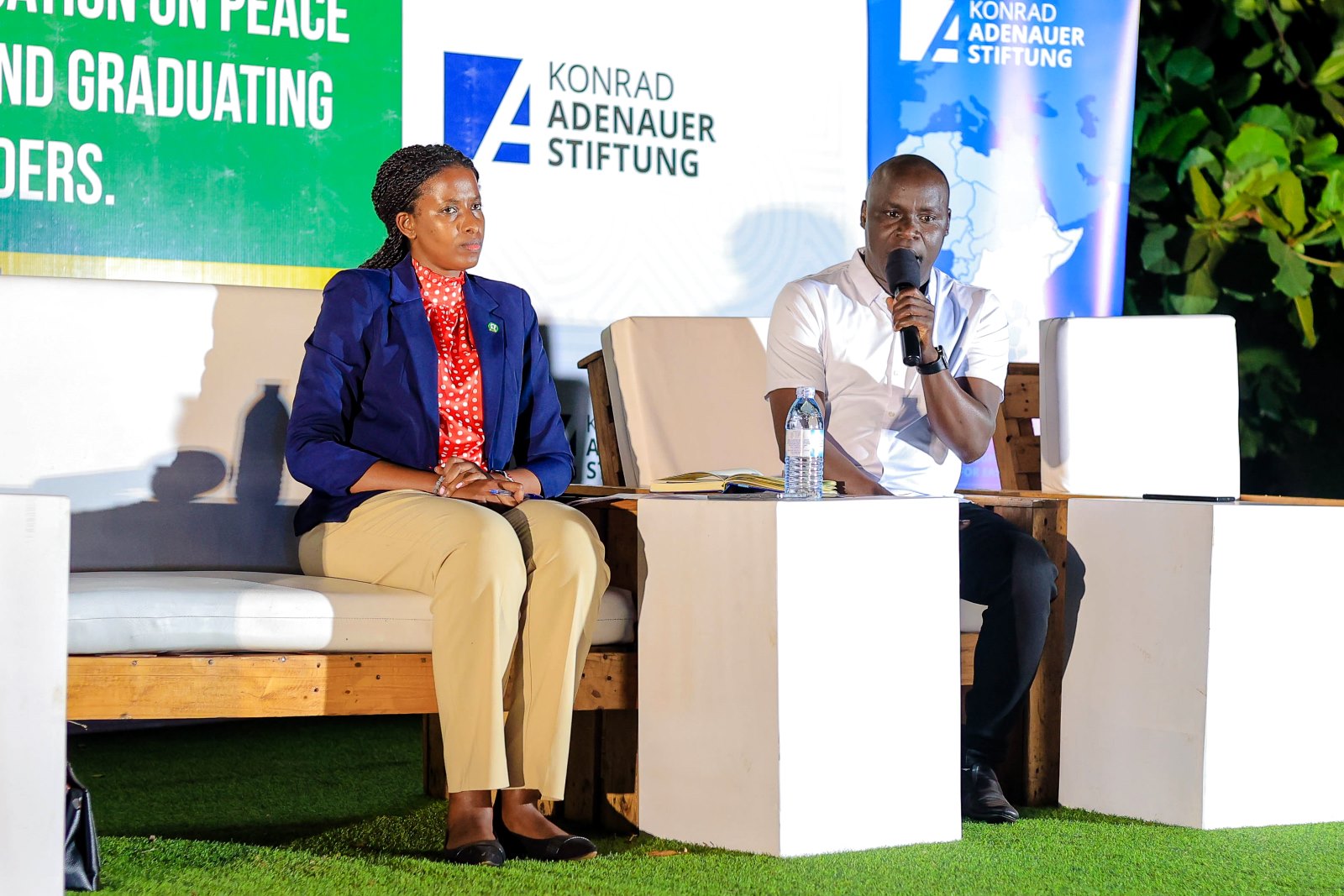
Ms. Nashiba Nakabira
- Highlighted the link between strong national institutions and regional integration, using South Sudan’s struggles as an example.
- Criticized barriers to intra-African movement and reliance on foreign donations, urging domestic resource mobilization.
- Addressed the gender disparities in peace processes, emphasizing the need for women’s capacity building in negotiation and diplomacy.
Mr. Robert Muhangi
- Urged youth to advocate for national peace and security action plans, ensuring resource allocation for youth training.
- Encouraged grassroots mobilization of small youth groups to engage in conflict resolution and peacebuilding.
- Highlighted the importance of integrating peace initiatives at the community level for broader impact.
Ms. Falade Olutoyin
- Questioned the persistence of patriarchy, advocating for gender equality as a pathway to women’s leadership and decision-making roles.
- Linked corruption to women’s marginalization, particularly in conflict zones, stressing the need to address governance flaws to enable women’s empowerment.
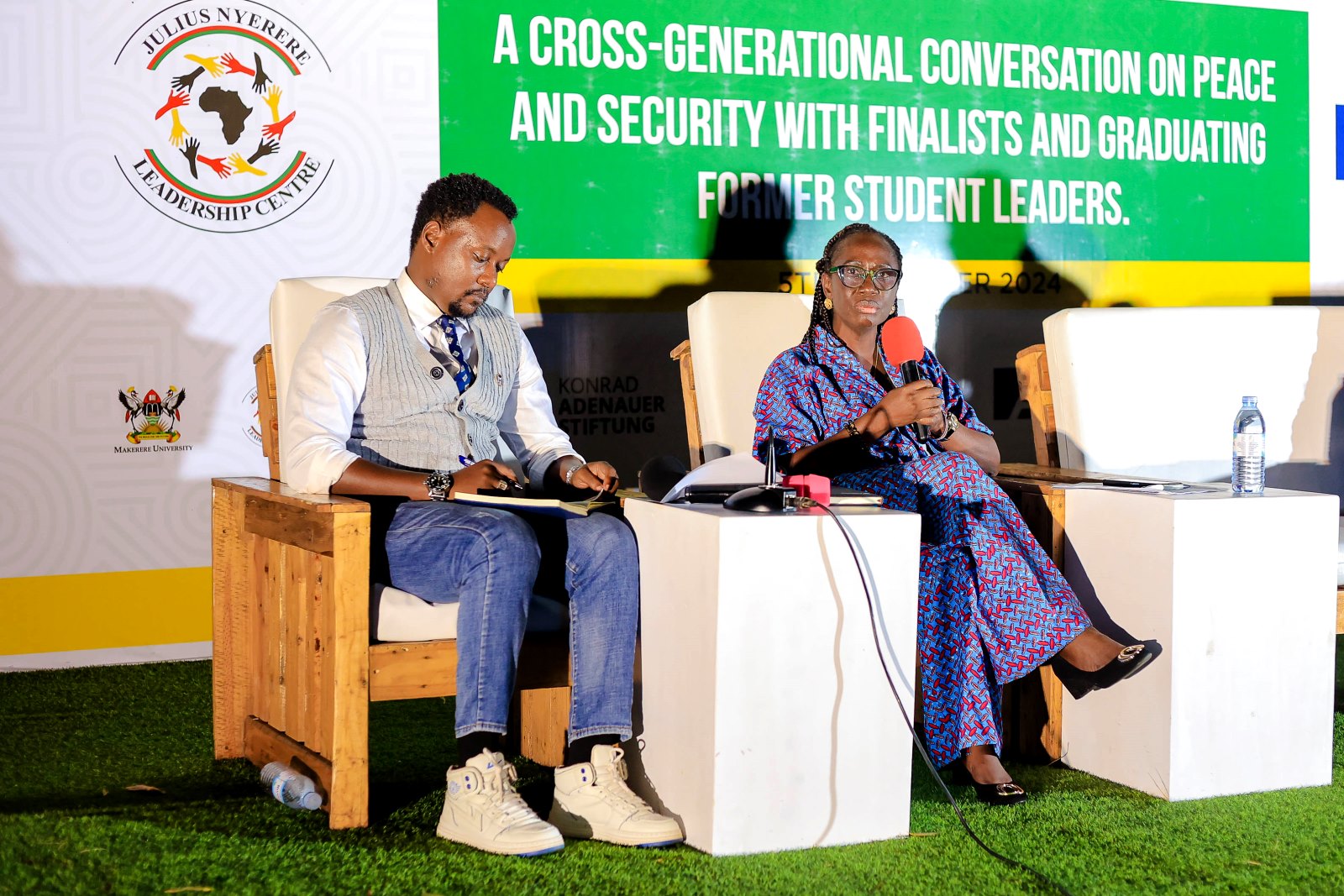
Core Recommendations:
- Address the Root Causes of Conflict: Focus on marginalization, resource greed, and identity-based grievances.
- Promote Human-Centric Security: Broaden definitions of security to encompass individual livelihoods and well-being.
- Empower Youth and Women: Foster meaningful participation in peace processes, ensuring capacity-building and leadership opportunities.
- Strengthen Institutions for Integration: Build robust national frameworks to facilitate effective regional collaboration.
- Leverage Media for Peace: Promote peace narratives and train journalists in peace reporting to prevent conflict escalation.
- Combat Corruption: Redirect resources from corrupt practices to inclusive governance and women’s empowerment.
This panel underscored the complexity of conflicts in Africa and the importance of a multi-faceted, inclusive approach to peacebuilding and governance. The discussion laid a foundation for actionable strategies to empower marginalized groups, harmonize initiatives, and foster a culture of sustainable peace. Here’s a summary of key insights and recommendations:
Key Issues Highlighted
Identity-Based Conflicts:
- Rooted in self-concept based on ethnicity, religion, or ideology.
- Often exacerbated by systemic marginalization and colonial legacies, as exemplified by the Tutsi-Hutu conflict.
- Requires addressing underlying marginalization to prevent escalation.
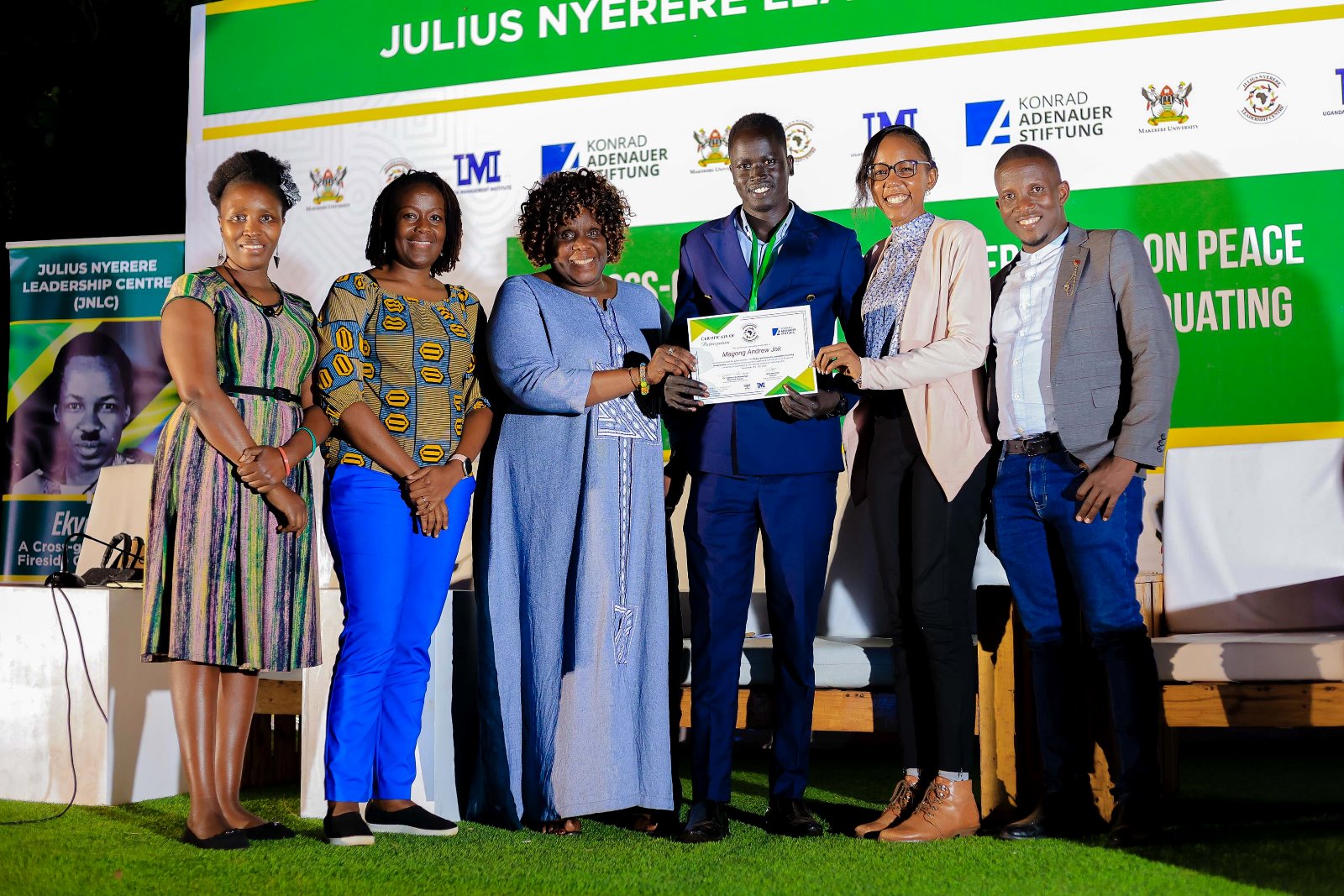
Youth and Women’s Participation:
- Youth face systemic barriers limiting their decision-making roles.
- Women are disproportionately affected by conflicts and underrepresented in peace processes.
- The intersectionality of age and gender adds layers of vulnerability, particularly for young women.
Structural Barriers:
- Weak national institutions hinder regional integration efforts.
- Fragmented initiatives lack coordination, undermining peacebuilding programs.
- Patriarchy restricts women’s roles in leadership and peacebuilding.
Abuse of Power in Professional Spaces:
- Women face exploitation and harassment in leadership contexts.
- Cultural and systemic issues discourage victims from seeking justice.
Corruption:
- Deepens economic inequalities, disproportionately affecting women in conflict zones.
- Diverts resources that could empower women and youth in leadership.
Educational Disparities:
- Women face additional challenges accessing quality education in conflict regions.
- Lack of networks and support makes it difficult for women to sustain leadership roles.
Recommendations and Insights
Enhancing Youth Engagement:
- Adopt and implement national action plans for youth inclusion in peace and security.
- Equip youth with skills through training programs like those led by the Julius Nyerere Leadership Centre.
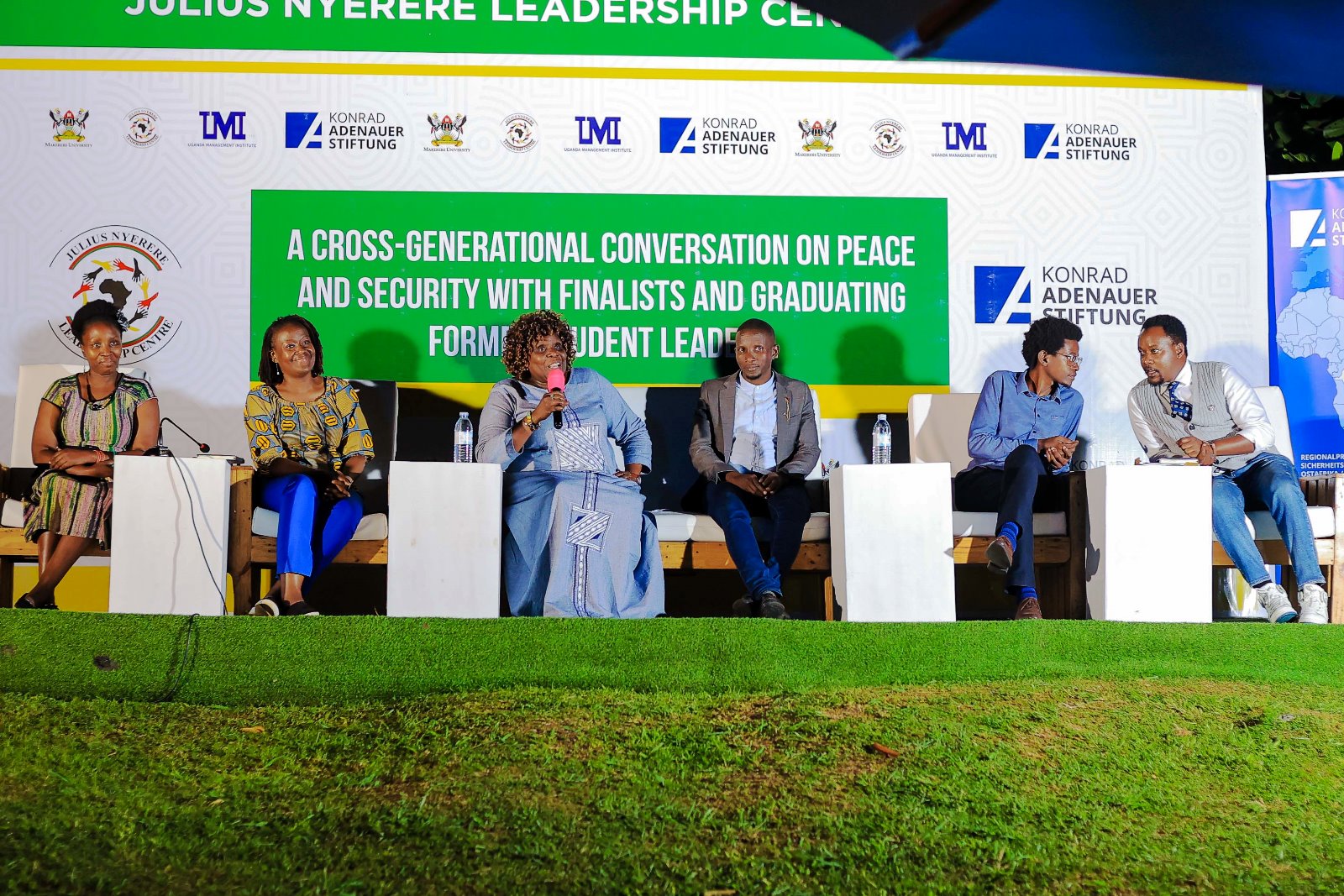
Promoting Women’s Leadership:
- Increase investment in women’s capacity-building for preventive diplomacy and peace negotiations.
- Address systemic barriers to education and leadership, ensuring equitable resource allocation.
Strengthening Institutions:
- Build robust national frameworks to support regional integration and peace initiatives.
- Mobilize domestic resources to reduce reliance on foreign aid.
Addressing Gender-Based Violence and Harassment:
- Establish policies and support systems to protect women in professional and leadership spaces.
- Create safe avenues for victims to report abuses without fear of retaliation.
Building Networks and Coalitions:
- Foster coordination among peacebuilding initiatives to align with global frameworks.
- Encourage collective advocacy by women and youth to amplify their voices.
Continuous Learning and Advocacy:
- Encourage participants to stay informed about global and regional conflicts.
- Promote proactive steps toward leadership, utilizing knowledge gained from training sessions.
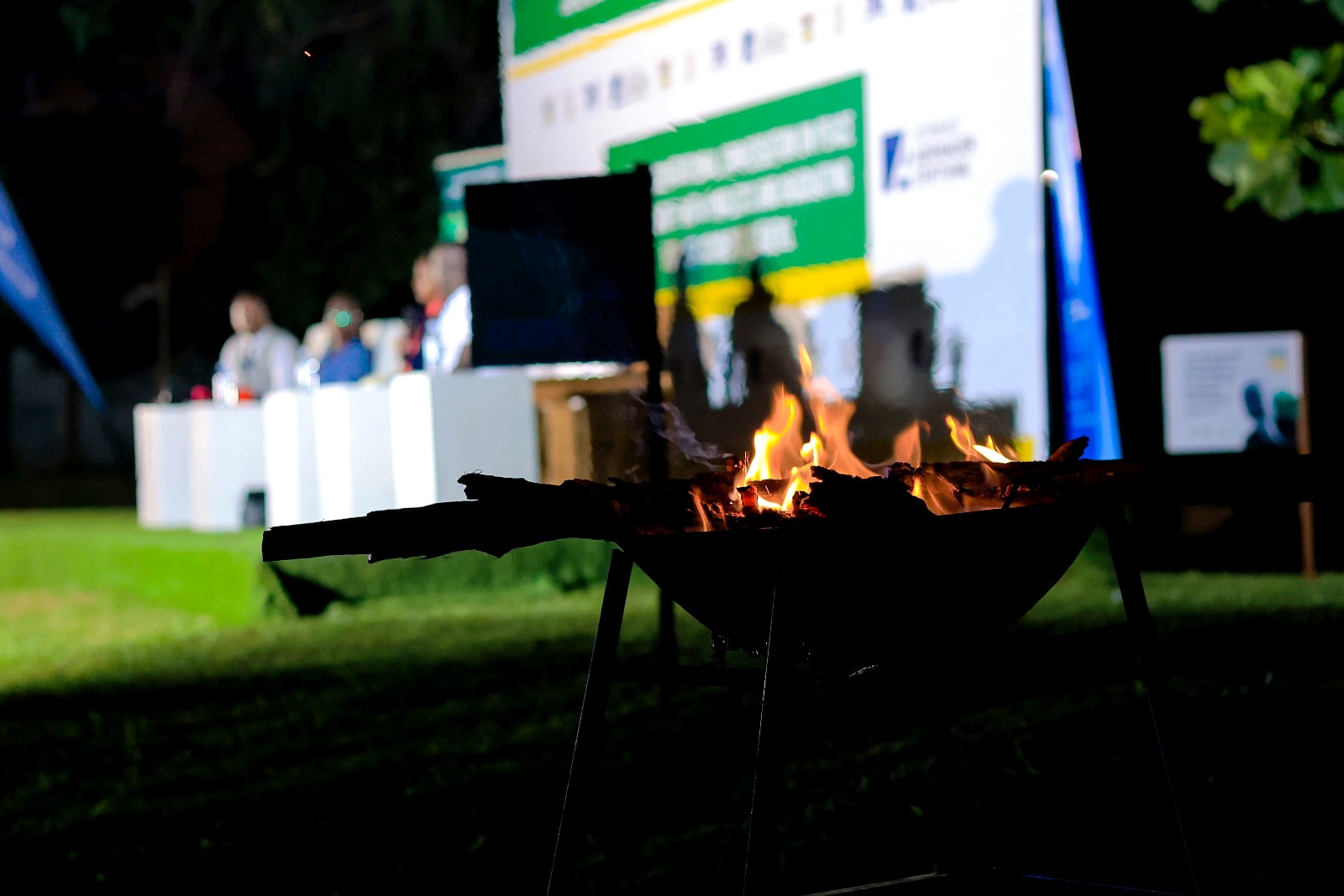
Looking Ahead
This transformative programme serves as a reminder that peacebuilding is a collective endeavor, requiring bold ideas, cross-generational collaboration, and unwavering commitment. The training and dialogue fostered a shared commitment to tackling peace and security challenges. As future leaders, participants were equipped with tools, perspectives, and networks to drive transformative change across Uganda and Africa.
Closing Remarks
The collaborative efforts of organisations like Konrad Adenauer Stiftung (KAS), Makerere University Rotary Peace Centre, and Julius Nyerere Leadership Centre highlight the value of mentorship and training. As emphasized by facilitators, this initiative is not only about expanding knowledge but also about equipping young leaders with tools to foster meaningful change. Furthermore, the cross-generational dialogue underscored the need for collective action, deliberate policy-making, and active participation to achieve sustainable peace and security in Africa.
You may like
-


Meet Najjuka Whitney, The Girl Who Missed Law and Found Her Voice
-


Mak hosts First African Symposium on Natural Capital Accounting and Climate-Sensitive Macroeconomic Modelling
-


Olivia Nakisita and the Quiet Urgency of Adolescent Refugee Health
-
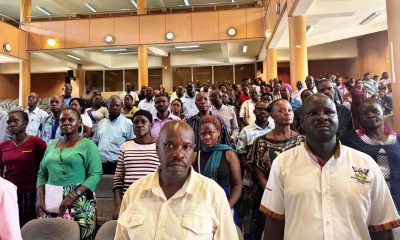

Support Staff Trained to Promote Safety of Students and Stakeholders
-
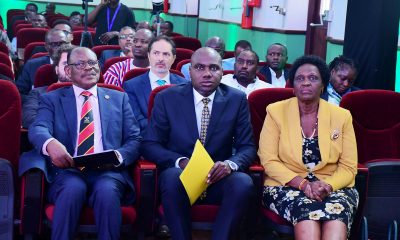

First African Symposium underscores the role of the Centre of Excellence for Africa Climate-Sensitive Macroeconomic Modelling
-
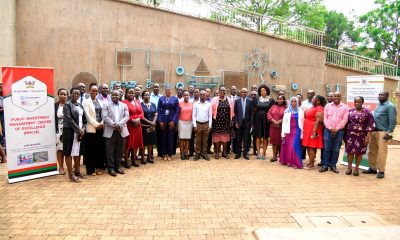

Makerere Hosts Second Cohort of MoKCC&MA Procurement Officers for E&S Safeguards Training
General
Over 9,200 to graduate at Makerere University’s 76th Graduation
Published
10 hours agoon
February 24, 2026
Pomp and colour defined the opening day of the Makerere University’s 76th Graduation Ceremony as thousands gathered to celebrate academic excellence and new beginnings.
The historic ceremony has brought together scholars, families, friends and industry partners in a vibrant celebration of achievement and possibility. Throughout the four-day event, the University will confer degrees and award diplomas to 9,295 graduands in recognition of their dedication and hard work.
Among the graduates, 213 will receive Doctor of Philosophy (PhD) degrees, 2,503 will graduate with Master’s degrees, and 6,343 will earn Bachelor’s degrees. In addition, 206 students will graduate with postgraduate diplomas, while 30 will be awarded undergraduate diplomas.
Of the total number of graduands, 4,262 are female and 5,033 are male. According to Vice Chancellor, this marks the first time in 15 years that male graduands have outnumbered their female counterparts.
The best overall graduand in the Sciences, Esther Ziribaggwa, graduated on the opening day with the Bachelor of Agricultural and Rural Innovation and an impressive Cumulative Grade Point Average (CGPA) of 4.77.

The ceremony marks a proud moment for Makerere University as it continues to nurture top-tier professionals across diverse fields.
While presiding over the graduation, the State Minister for Primary Education, Hon. Dr. Joyce Moriku Kaducu, on behalf of the First Lady and Minister of Education and Sports, Hon. Janet Kataaha Museveni, pointed out that Makerere University is a model institution, where leaders are nurtured, scholars are sharpened, and where dreams have been given direction.
In her address, Hon. Museveni, highlighted Government’s deliberate investment in research, innovation, and infrastructure to strengthen higher education in Uganda.
“The establishment of the Makerere University Research and Innovation Fund (RIF), supports high-impact research and innovation that directly contributes to national priorities and development. Through this initiative, thousands of researchers and innovators have pursued practical, scalable solutions that are transforming communities and key sectors across Uganda,” Mrs Museveni, said.
The Minister also noted that Parliament’s approved a USD 162 million concessional loan to upgrade science, technology, and innovation infrastructure at Makerere University. The funding will facilitate the construction of modern laboratories, smart classrooms, and state-of-the-art facilities for Engineering and Health Sciences, investments expected to position the University firmly within the Fourth Industrial Revolution.
“Government has embarked on the construction of a National Stadium at Makerere University and other institutions of higher learning across the country. This will promote physical education, strengthen talent identification, and boost investment in the sports sector,”

Turning to the graduands, the Minister encouraged them to see themselves not merely as job seekers, but as job creators and solution-makers.
Uganda and Africa need innovators who will modernize agriculture; engineers who will build quality infrastructure; healthcare professionals who will strengthen health systems; and educators who will inspire the next generation,” the Honourable Minister said.
She reminded graduates that they are entering a rapidly changing world shaped by Artificial Intelligence, climate change, and shifting global markets. To thrive, she advised them to remain adaptable, creative, and committed to lifelong learning.
She also encouraged graduates interested in entrepreneurship to tap into the Government’s Parish Development Model, which provides community-based financing and production support.
Quoting Proverbs 3:5–6, the Minister urged the graduates to trust in God as they embark on their next chapter.
She extended special appreciation to the Mastercard Foundation for its 13-year partnership with Makerere University in expanding access to education and empowering young people in Uganda and beyond.
In his speech, the Chancellor of Makerere University, Dr Crispus Kiyonga, urged graduands to harness research, innovation and technology to drive Uganda’s transformation.

“This is a milestone in your lives. You have invested time, discipline and hard work to attain these qualifications. It is important that you derive value from this achievement, not only for yourselves, but for your families and for society.” Dr Kiyonga, said.
Dr. Kiyonga expressed gratitude to the Government of Uganda for its continued financial support to the University, particularly the funding allocated under MakRIF, which he described as critical in strengthening the institution’s research capacity.
“Research plays a very vital role in the development of any community. Makerere as the oldest University in the country is doing a significant amount of research, However, more work is required to mobilize additional resources to further strengthen research at the University.” Dr Kiyonga, noted.
Acknowledging the challenges of a competitive job market, Dr. Kiyonga encouraged graduates to think beyond traditional employment pathways.
“It is true that the job market may not absorb all of you immediately. But the knowledge you have acquired is empowering. You can create work for yourselves, individually or in teams.” Dr Kiyonga, said.
He advised the graduands to embrace discipline, integrity and adaptability in the workplace, and to take advantage of technology and digital platforms to innovate and respond to societal challenges.
“Every development challenge presents an opportunity. Believe that you can apply your knowledge to create solutions with impact.” He said.
Addressing the congregation, the Vice Chancellor, Prof Barnabas Nawangwe, congratulated the graduands, particularly staff and societal leaders on their respective achievements.

“I congratulate all our graduands upon reaching this milestone. In a special way I congratulate the members of staff, Ministers, and Members of Parliament that are graduating today as well as children and spouses of members of staff,” Prof Nawangwe, said.
In his speech, Prof Nawangwe, recognized outstanding PhD students, particularly members of staff. who completed their PhDs in record time without even taking leave from their duties.
He called upon graduates not to despise humble beginnings but rather reflect on the immense opportunities around them and rise to the occasion as entrepreneurs.
“You are all graduating with disciplines that are needed by society. We have equipped you with the knowledge and skills that will make you employable or create your own businesses and employ others. Do not despair if you cannot find employment. Instead, reflect on the immense opportunities around you and rise to the occasion as an entrepreneur,” Prof Nawangwe, said.
Prof Nawangwe called upon the graduands of PhDs to use their degrees to transform the African continent.
“As you leave the gates of Makerere I urge you to put to good use the knowledge you have received from one of the best universities in the World to improve yourselves, your families, your communities, your Country and humanity. Let people see you and know that you are a Makerere alumnus because of the way you carry yourself in society with dignity and integrity. Put your trust in God and honour your parents and opportunities will be opened for you,” Prof Nawangwe, said.
Delivering a key note address, Prof. Nicholas Ozor, the Executive Director of the African Technology Policy Studies Network Nairobi, Kenya ((ATPS). Reminded the graduates that a degree is not a finish line but the beginning of accountability. “The world is a complex, fast changing and deeply unequal. Degrees make you responsible for others not better than them,” Prof Ozor, said.

The 76th Graduation Ceremony of Makerere University will be held from Tuesday 24th to Friday 27th February, 2026. A total of 213 PhDs (87 female, 126 male), 2,503 Masters (1,087 female, 1,416 male), 206 Postgraduate Diplomas (80 female, 126 male), 6,343 Undergraduate Degrees (2,999 female, 3,344 male), and 30 Undergraduate Diplomas (9 female, 21 male) will be graduating from all the Colleges.
Ms. Sarah Aloyo and Ms. Nakato Dorothy both students of the Bachelor of Procurement and Supply Chain Management emerged as the best in the Humanities and Best Overall students with a CGPA of 4.93. Mr. Ssewalu Abdul, a Bachelor of Leisure and Hospitality Management student emerged second best in the Humanities with a CGPA 4.90. Ms. Esther Ziribaggwa emerged as the best student in the Sciences with a CGPA of 4.77 in the Bachelor of Agricultural and Rural Innovation, while Mr. Simon Mungudit emerged second best in the Sciences with a CGPA of 4.76 in the Bachelor of Science in Petroleum Geoscience and Production.
Commencement Speakers
- Day 1 – Prof. Nicholas Ozor, the Executive Director of the African Technology Policy Studies Network, Nairobi, Kenya
- Day 2 – Prof. Dr. Maggie Kigozi, Chairperson Makerere University Endowment Fund Board
- Day 3 – Dr. Patricia Adongo Ojangole, Managing Director, Uganda Development Bank Limited
- Day 4 – Ms. Reeta Roy, Former President & Chief Executive Officer, Mastercard Foundation
The 76th Graduation Ceremony will be held at the Freedom Square following the schedule below:
Tuesday, 24th February, 2026
College of Agricultural and Environmental Sciences (CAES)
College of Computing and Information Sciences (CoCIS)
College of Education and External Studies (CEES)
School of Law (SoL)
Livestream Link for Day 1: https://youtube.com/live/wVGPA0FJ9pU
Wednesday, 25th February, 2026
College of Health Sciences (CHS)
College of Natural Sciences (CoNAS)
College of Veterinary Medicine, Animal Resources and Bio-security (CoVAB)
School of Public Health (SPH)
Thursday, 26th February, 2026
Makerere University Business School (MUBS)
College of Business and Management Sciences (CoBAMS)
Friday, 27th February, 2026
College of Engineering, Design, Art and Technology (CEDAT)
College of Humanities and Social Sciences (CHUSS)
Institute of Gender and Development Studies (IGDS)
Makerere Institute of Social Research (MISR)
General
Mak Selected to Host Alliance for African Partnership Africa Office
Published
2 days agoon
February 23, 2026
Makerere University has been selected to host the Africa Office of the Alliance for African Partnership (AAP). The significant milestone that underscores Makerere’s role in fostering research, innovation, and global collaborations across the continent was announced at a meeting of the University’s Central Management with an AAP delegation on 23rd February 2026.
Makerere’s selection was based on the University’s robust commitment, alignment with the AAP’s Strategic Plan, and proven ability to manage consortium activities. The AAP, which was initiated by Michigan State University (MSU) in collaboration with Ten African Universities and agricultural policy research networks in 2016, targets critical challenges in education, youth empowerment, health and nutrition, agri-food systems, science and technology, water, energy, environment, and culture and society.
Addressing the delegation consisting of AAP Co-Directors from MSU, Dr. Jose Jackson-Malete and Dr. Amy Jamison, accompanied by newly-appointed Director of the AAP Africa Office, Dr. Racheal Ddungu Mugabi and Ms. Clare Cheromoi, the Vice Chancellor, Prof. Barnabas Nawangwe who appreciated the choice of Makerere to host the Africa Office said:
“One of the greatest challenges facing African universities is PhD training, particularly supervisory capacity. Through partnerships such as the Alliance for African Partnership we can leverage international expertise to strengthen supervision—whether through training supervisors or through joint supervision arrangements.”
Prof. Nawangwe equally applauded joint initiatives such as the Grant Writing and Publication project, which gave rise to the establishment of a Writing Centre that he said can be used to build capacity in AAP member universities with Makerere as the hub. Officially launched on 21st March 2023, the project is living up to its expectation of becoming a springboard for strong postdoctoral collaborative research for both institutions and other US universities.
Dr. Titus Awokuse, Vice Provost and Dean for International Studies and Programs at Michigan State University (MSU) who attended virtually, reiterated that Makerere’s selection reflects its long-standing commitment to advancing African higher education, research excellence, and meaningful global collaboration.
Reflecting on the origins of the Alliance for African Partnerships (AAP), Dr. Awokuse explained that nearly a decade ago, MSU initiated a transformative conversation in Atlanta centered on the question: How should we partner differently? From this dialogue emerged AAP—an Africa-centered consortium that now brings together 12 institutions across Africa and the United States.

He emphasized that AAP is grounded in equity, mutual benefit, shared leadership, and deep respect for African priorities and expertise. Since its founding, MSU has served as convener and key supporter, working with member institutions to strengthen research collaboration, promote faculty and student engagement, and address shared development priorities.
Dr. Awokuse underscored that AAP’s success is the result of collective vision and commitment, not the efforts of a single institution. He paid tribute to Lilongwe University of Agriculture and Natural Resources for hosting the Africa Office in its early years and acknowledged the foundational leadership of the inaugural Africa Office Director.
He described the launch of the Africa Office at Makerere University as a significant milestone that reinforces Africa-led leadership, strengthens regional collaboration, and enhances responsiveness to emerging opportunities. MSU, he affirmed, remains fully committed to AAP and to working closely with Makerere and all consortium partners to expand collaborative research, nurture the next generation of scholars, and advance Africa-led solutions to global challenges.
The newly-appointed AAP Africa Office Director, Dr. Racheal Ddungu Mugabi is a member of faculty in the Department of Development Studies, Institute of Gender and Development Studies. Her work on intersectional inequalities in Uganda and other Global South regions uniquely positions her to drive collaborative research and partnerships at the Africa Office.
Initially founded by ten African Universities and MSU, AAP now comprises eleven African members including; the African Network of Agricultural Policy Institutes (ANAPRI)-Zambia, Egerton University-Kenya, Lilongwe University of Agriculture and Natural Resources (LUANAR)-Malawi, Makerere University-Uganda, United States International University-Africa-Kenya, Universite Cheikh Anta Diop-Senegal, Universite Yambo Ouologuem de Bamako-Mali, University of Botswana-Botswana, University of Dar es Salaam-Tanzania, University of Nigeria, Nsukka-Nigeria, and the latest, University of Pretoria-South Africa.
These Universites collaborate under Focal Points to advance policy-relevant research and sustainable development. Makerere University’s Focal Point is Prof. Robert Wamala, Director of Research, Innovations and Partnerships (DRIP).
Addressing the University Management, Dr. Jackson-Malete outlined the African Futures Research Leadership Program, which nurtures early career scholars through mentorship and skill-building as one of AAP’s flagship programs. She noted that the Program that prioritizes female participants or men committed to promoting women in higher education has for the first time during its fifth cohort admitted the first male, Dr. Alfadaniels Mabingo from the Department of Performing Arts and Film, Makerere University.
The AAP Africa Office at Makerere will coordinate activities, boost research collaboration, mobilize resources, and enhance global engagements for socio-economic transformation. This aligns with Makerere‘s broader goals of leveraging international expertise to build resilient institutions.
View more photos from the event: https://flic.kr/s/aHBqjCLjoA
Trending
-

 Humanities & Social Sciences2 days ago
Humanities & Social Sciences2 days agoMeet Najjuka Whitney, The Girl Who Missed Law and Found Her Voice
-

 Health6 days ago
Health6 days agoUganda has until 2030 to end Open Defecation as Ntaro’s PhD Examines Kabale’s Progress
-

 Agriculture & Environment5 days ago
Agriculture & Environment5 days agoUganda Martyrs Namugongo Students Turn Organic Waste into Soap in an Innovative School Project on Sustainable Waste Management
-

 General7 days ago
General7 days agoMastercard Foundation Scholars embrace and honour their rich cultural diversity
-

 Health2 weeks ago
Health2 weeks agoCall for Applications: Short Course in Molecular Diagnostics March 2026
